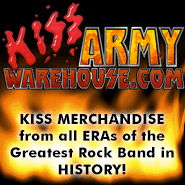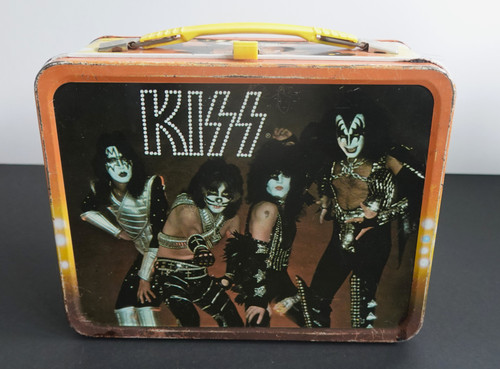Author Archives: Steve Stierwalt
Peter Criss on Eddie Trunk 12.14.2012
Early KISS – A Forgotten Perspective from Their First Year
Gene Simmons The Magnificent Others with Billy Corgan
Gene Simmons Hints At His Solo Band Will Top KISS With Setlist Of Never-Played Songs

According to Gene Simmons, his solo band will play songs KISS never did.
Paul Stanley Aucoin Pro Arts Motorcycle Poster at KISSArmyWarehouse.com!
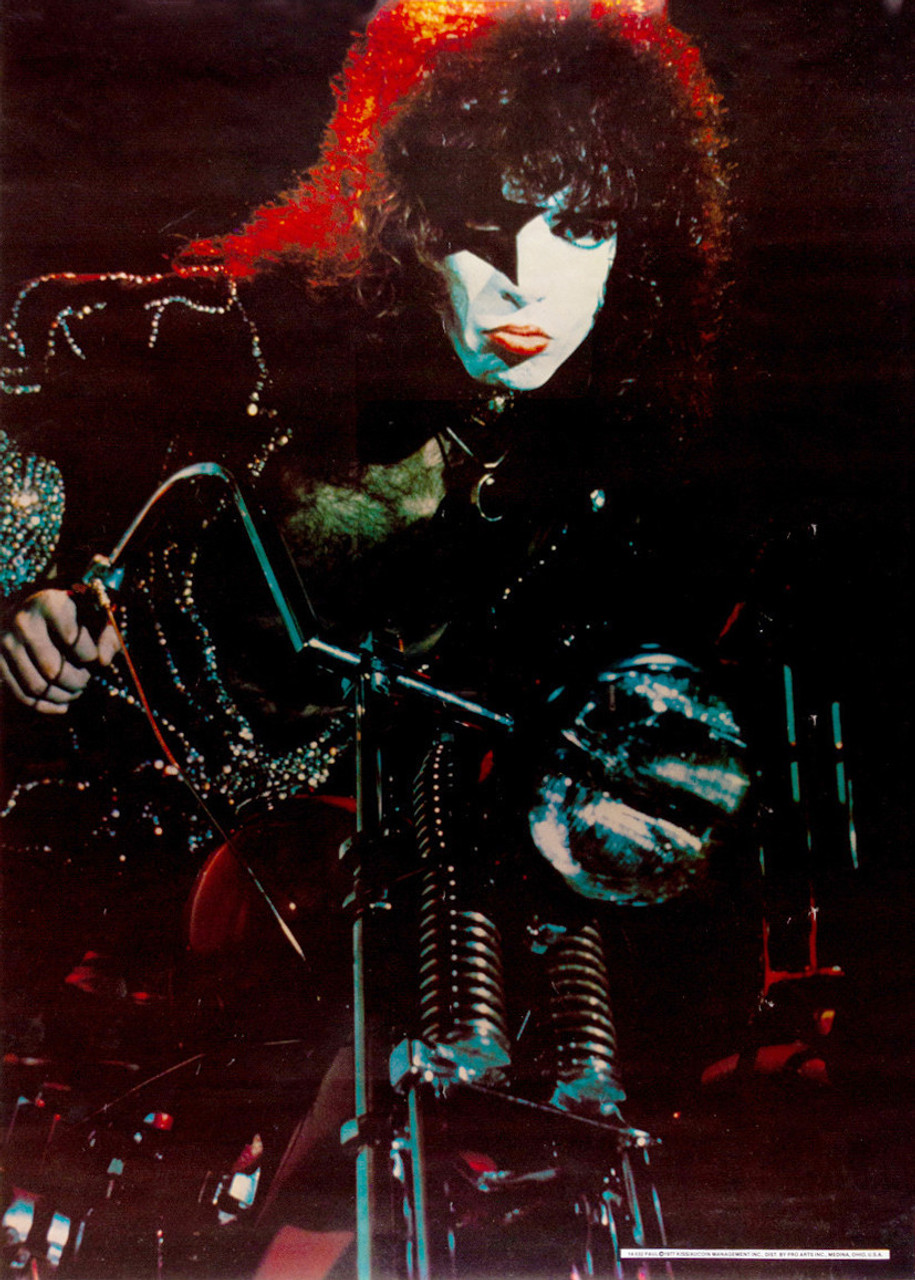
Official, original printing from 1977 – this is NOT a reproduction. The KISS Motorcycle poster set are some of the most exciting and interesting photos of KISS ever taken. This is STILL SEALED AND ROLLED!
20 x 28 inches
A celebration 50 years in the making
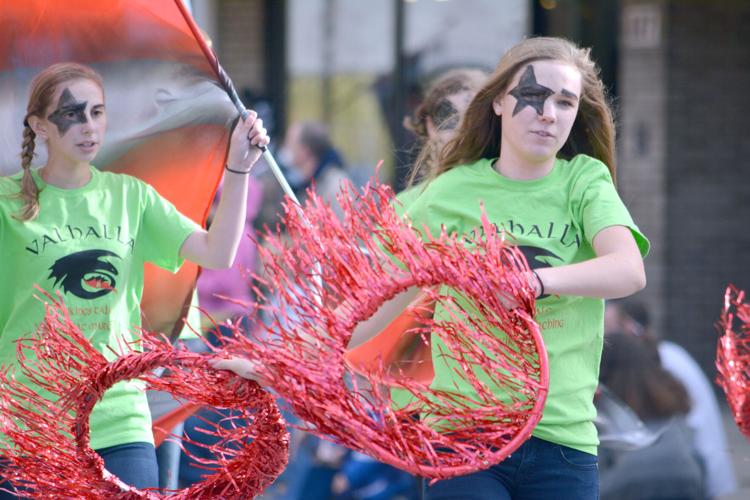
CADILLAC — Is something in the works for October that commemorates Cadillac’s role in rock ‘n’ roll history?
The obvious answer is yes, but for now, what it is remains shrouded in mystery. On Oct. 10, Cadillac will celebrate the 50th anniversary of KISS visiting the city. The website www.kisscadillac.com currently displays only the October date and invites people to sign up for email updates.
While there are about nine months to speculate — and many will — nothing has been officially announced beyond what’s on the KISS Cadillac website. During the 40th anniversary celebration in 2015, Paul Stanley and Gene Simmons released a video message for Cadillac, as they were unable to attend due to the band’s tour in Australia.
With KISS no longer touring, could Stanley and Simmons come to Cadillac? Only time will tell.
The Cadillac News reached out to Jim Neff, who played a role in the band’s visit nearly 50 years ago, but he did not immediately respond. Marci Hensley of the Cadillac Area Visitors Bureau said they are still in the early stages of planning.
She said the Oct. 10 date was shared to allow people to save the date.
She also said the visitors bureau is working with Neff and Cadillac Area Public Schools to plan the event. The best thing people can do is sign up for the newsletter at kisscadillac.com and wait for updates in the coming weeks and months, Hensley said.
For those unfamiliar with the connection between Cadillac and KISS, the band visited the northern Michigan town in 1975 after forming a friendship with Cadillac High School and its football team.
After a slow start in 1974, the team began playing KISS records in the locker room to stay loose. The band heard about it and wanted updates on the team’s progress. The Vikings then won their final seven games. In October 1975, Cadillac High School made rock ‘n’ roll history when KISS played at the school’s homecoming.
Russ Ballard Back In The ‘New York Groove’
(Freeman) Renowned rock singer Russ Ballard is pleased to announce the release of a revisited version of his famous hit “New York Groove”, along with a new music video, both out now via Frontiers Music Srl.
The song was a hit for KISS guitarist Ace Frehley on his 1978 solo album. Russ had this to say about the new version, “I wrote the song in 1975 and it was a very quick process, written and recorded in about three hours. I had down time in the studio, no song – just a title, ‘New York Groove’ and an idea to play it to a Bo Diddley rhythm.”
Ballard is simply one of the most renowned and gifted songwriters in pop and rock music. His music career started when he was only 14 years old and he wrote a tune, which was recorded by The Shadows, appearing on their album ‘The Sound Of The Shadows’ in 1964.
During the 70’s and 80’s, his songs ruled the airwaves and the list of hits is pretty much endless. From “Since You Been Gone” (Rainbow), “God Gave Rock’n’Roll To You” (Argent and Kiss), “So You Win Again” (Hot Chocolate), “New York Groove” (Hello and Ace Frehley), “You Can Do Magic” (America), “Winning” (Santana) or “I Don’t Believe In Miracles” (Colin Blunstone) – just to name a few – everyone who needed a great song knew that with Russ Ballard they could not go wrong.
KISS Frontman PAUL STANLEY To Display His Artwork At Two Shows In Florida Later This Month

KISS – Lane Bryant runway show performance – 02/05/02
David Edward Byrd, Famed Rock and Broadway Poster Artist, Dies at 83
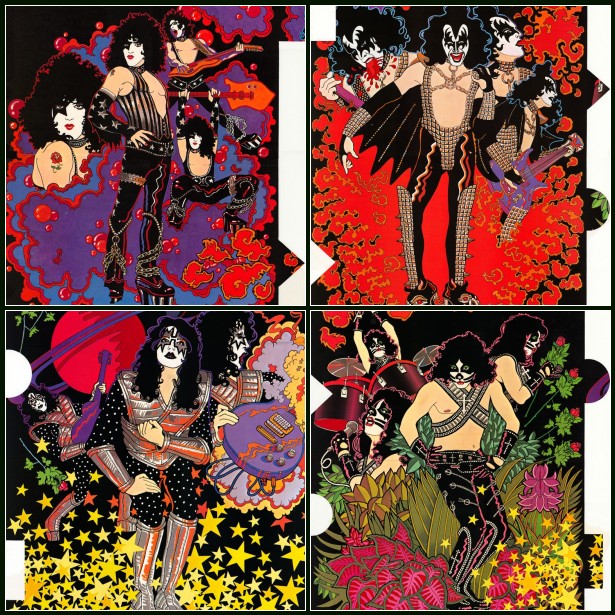
David Edward Byrd, who created psychedelic posters for Jimi Hendrix, The Who and Grateful Dead shows and for such Broadway productions as Follies, Godspell, Jesus Christ Superstar and Little Shop of Horrors, has died. He was 83.
Byrd died Monday at a hospital in Albuquerque, New Mexico, rep Jerry Digney announced. Jolino Beserra, his partner of 40 years, said on Facebook that he died of pneumonia.
One of the foremost graphic artists of 20th century pop culture, Byrd did lots of work for rock promoter Bill Graham’s Fillmore East, which opened in the East Village in Manhattan in 1968, and designed a poster for the original Woodstock festival (it turned out it wasn’t used when the event was moved).
He designed posters for The Rolling Stones’ tour of the U.S. in 1969 and The Who’s performance of their rock opera Tommy at the Metropolitan Opera House in 1971 and album covers for Lou Reed’s Sally Can’t Dance in 1974 and the members of KISS in 1978.
Here is a link to an interview with David here at KISSAsylum.com
KISS Army Spain Joins to Talk the Book, Last KISS At The Garden! This Book is Amazing!
Episode 606. Javier Rueda and Mauricio Vázquez from KISS Army Spain join us to talk about their amazing book LAST KISS AT THE GARDEN, DECEMBER 1 & 2, 2023/
This new book complements the one they did back in 2021: KISS DESTROYS MADISON SQUARE GARDEN, 1977-2019. After more than 250 shows on their seemingly never ending final tour and on their 50th anniversary, the curtain fell for the very last time. And as we all expected it was in the city where the band was born and at the legendary Madison Square Garden.
LAST KISS AT THE GARDEN, DECEMBER 1 & 2, 2023 captures all of the magic that surrounded the final two shows of KISStory, which was a lot. An unforgettable experience for the fans coming from different countries who attended the two mind-blowing concerts at the famous venue in New York. But a concert lasts two hours only and the whole experience was much bigger than that. A long weekend that started off on Thursday, November 30th and finished on Sunday, December 3rd. The atmosphere in New York City was unbelievable and KISS was everywhere. A dream-like weekend which the KISS Army worldwide dressed to kill for.
LAST KISS AT THE GARDEN, DECEMBER 1 & 2, 2023 is a 184 full-colour page and A4 size (8.2×11.4 inches) book with more than 800 photos featuring articles, exclusive interviews, anecdotes, chronicles by fans who were lucky enough to live this historical moment, tickets, posters, clippings, backstage passes and ALL the facts that you can imagine about these two shows at the New York temple. All in all, a real jewel which all the KISS fans will love.
Order both books below:
KISS DESTROYS MADISON SQUARE GARDEN 1977-2019 Book at KISSArmyWarehouse.com ALMOST GONE!
LAST KISS at the Garden Book December 1 & 2 2023 Book at KISSArmyWarehouse.com LIMITED SUPPLY!
Blimp Bowl 2025 Day 1 1pm Matchup: Lynyrd Skynyrd vs. KISS

2025 is here, and we need your help trying to decide the best band in all of Blimpville. That means you need to vote. Vote. Vote. Vote
WBLM has been around for now over 50 years, and we want to keep celebrating all that is classic rock and roll with this ultimate tournament of bands and singers.
So how can you vote on your favorites?
Blimpsters can vote either on the WBLM App, wblm.com, WBLM Facebook page, call in to 888-898-1029 or fill out the above poll for their favorite band. The polls will be open each day with matchups taking place throughout the weekday and right through the weekend of February 8!
KISS Releases Signature Brand of Tepid, Uninspired, Derivative, Bland Coffee

LAS VEGAS — Notable classic rock band and purveyor of merchandise KISS released a signature brand of coffee whose taste is closely aligned with their mundane musical output, bored and unimpressed sources report.
“Our new line of ‘I Was Made for Lovin’ Brew’ signature coffee has a taste that will affect you the exact same way our music does,” KISS frontman Gene Simmons said while relaxing in his unspeakably lavish Las Vegas mansion. “It’s a standard Colombian brew along the lines of something like Maxwell House or Folgers, that’s best enjoyed black and served at room temperature, preferably while listening to one of our more featureless songs like ‘Lick It Up’ or ‘Rock and Roll All Nite.’ It’s even low in caffeine to preclude the possibility of the consumer receiving even a superficial rush of adrenaline upon drinking it. Let’s rock!”
KISS superfan Mitch Smith reacted to his favorite band’s newest item.
“I drank a couple cups while listening to ‘Crazy Nights’ this morning,” Smith offered. “It was like drinking lukewarm water with the barest hint of coffee flavor, which is basically the beverage equivalent of the music I was listening to. I didn’t even feel energized after drinking it, and actually fell asleep at my kitchen table. It was great! The price tag was a little steep at $30 for a 12-ounce bag, but it was totally worth it if you ask me. I’ve already paid exorbitant amounts of money for KISS air guitar strings and KISS condoms, which I’ve never used, so I’m glad that I’m able to get some utility out of one of the KISS-themed items that I own.”
Five times musicians entered the video game world
The video game industry is now worth more than film and music combined, valued in the hundreds of billions globally. According to many studies, 2013’s Grand Theft Auto V is the “most financially successful media title of all time”, surpassing any book, film, or music release—excluding Minecraft and Tetris, which exist across countless platforms. Long gone are the days when gaming was the niche domain of computer hobbyists and little kids.
With such a lucrative opportunity, it’s no wonder that many bands over the years have been more than happy to slap their name and likeness on a video game to make a quick buck. Whether out of crass commercialism or genuinely invested intrigue in gaming’s creative possibilities, there was a time when your favourite artists may well have offered a gripping, first-person adventure quest along with a T-shirt, mug, and, in Metallica’s case, a licensed Monopoly board.
Kiss: Psycho Circus: The Nightmare Child (2000)
You knew they were coming. Naturally, the fire-breathing hard rockers Kiss‘ perpetual dollar-signed eyes would see video games as another tantalising merchandising opportunity, along with lunchboxes, ‘kondoms’, and even a funeral casket. Alongside Kiss Pinball for the PlayStation, the Gene Simmons and Paul Stanley Corp also oversaw a video game of their Psycho Circus comic book series.
Released on Sega’s final console, Dreamcast, the game is essentially a Quake clone where a Kiss tribute band is transported to some mythical ether of hellish, carnival monsters and bosses lifted from the comic’s villains. Progressing through the game, you’ll acquire power-ups corresponding to the band members’ theatrical identity, Simmons’ firepower, etc. Not a bad effort for 2000, but pedestrian when considering the competition around at the time.
KISS – Detroit rock city (AI yacht rock parody)
Watch ACE FREHLEY Perform In Portland, Maine
Fan-filmed video of Ace Frehley‘s February 1 concert at AURA in Portland, Maine can be seen below.
In a recent interview with Meltdown of Detroit’s WRIF radio station, Frehley confirmed that he had commenced work on “Origins Vol. 3”, the sequel to Ace‘s 2016 and 2020 collections of cover songs that inspired the former KISS guitarist. “I’m working on ‘Origins Vol. 3’, ’cause that’s the next record I’m putting out in 2025,” he said. “So, we’re starting to gear up for that and figuring out which songs [to include on the LP]. I have a long extensive list and we’re slowly whittling it down to which ones we’re gonna track.”
Frehley went on to say that he is once again working with TRIXTER‘s Steve Brown, who produced and co-wrote all the material on Ace‘s latest solo album, “10,000 Volts”, which was released in February 2024 via MNRK Music Group (formerly eOne Music).
“‘Origins Vol. 3’ will probably be out before the end of 2025,” Ace revealed. “I usually put out a record every year, year and a half, two years now. I have two more albums on my record deal with MNRK Music. And everything’s great.”
KISS – Gene Simmons as Mr. Big on The Hitchhiker – 01/28/86
Part 20, KISS – Recording “Lick It Up”, Problems with Vinnie and Unmasking on MTV
Vintage Aucoin KISS Lunchbox 1977 with Thermos at KISSArmyWarehouse.com!
We recently picked this up in a collection. See photos for condition. Definitely the real deal. There is rust on the surface throughout. If you have never owned one this would be a good opportunity to fill that void in your collection. Includes the thermos but it has started to come apart. See photos.

